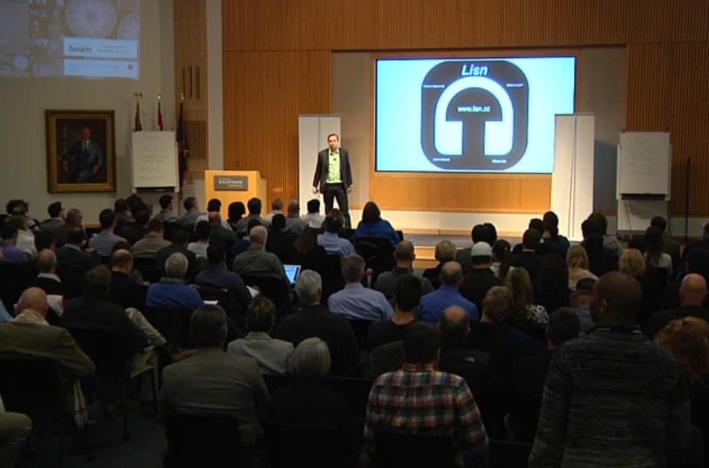This week’s 1 Million Cups at the Kauffman Foundation featured startups pitching an online platform that aggregates podcasts and an app to build personal contact networks.
The panel of startup inquisitors consisted of Mindy Hart, associate director of the Entrepreneurial Leadership Project at MidAmerica Nazarene University; and George Brooks, an original organizer of 1 Million Cups and founder of CremaLab.
Lisn at 1 Million Cups
David Gill, founder of Lisn, discussed his company’s efforts to create a one-stop shop for podcast listeners by making a wide variety of podcasts available on a single platform for users.
Although nearly one in three Americans listens to podcasts, Gill said, the community of podcast listeners is decentralized. With Lisn, podcast fans can collect, share and comment on their favorite podcasts in a central location on the Web.
“It really lets the user slice up the podcast market in whatever way they see fit,” Gill said.
In addition to offering full-length podcasts, Lisn offers brief clips or “moments” from podcasts to potentially hook listeners and get them to adopt the service. Monetization is planned to come from podcast advertisers and the selling of Lisn’s customer data to those advertisers.
REON at 1 Million Cups
Next up was Sam Raiche, founder of Remember Everyone, who said that his company’s new mobile app, REON, can improve how people connect and network in the business world, socially and even romantically.
“I want people to connect with each other,” Raiche said.
Instead of exchanging business cards—“We fill our pockets with so many business cards, we can barely walk,” Raiche said—the REON app offers a simpler way to remember everyone you meet by simply using your smartphone or other mobile device, he said.
Contact information can be transferred with the swipe of a finger, Raiche said, and REON users get a photo with every connection they make. Each new contact is time-stamped, and a GPS function “maps” each connection, so users can remember where they met.
“As soon as you connect with someone on our app, it’s in your address book, as well,” Raiche said.
Instead of trying to “get 1 million users around the United States,” Raiche said, the app will focus on well-defined areas, like college campuses, to build its brand. “We feel like that’s a much better strategy for us,” he said.


